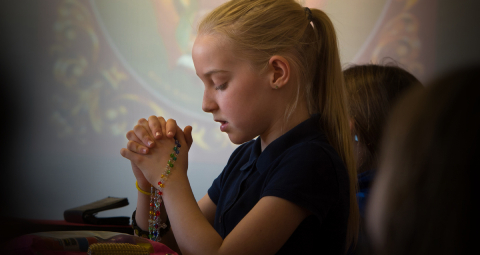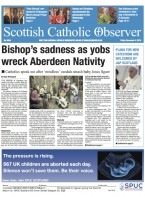BY No Author | September 27 2019 | ![]() 0 COMMENTS
0 COMMENTS ![]() print
print

Teachers reject claims that Catholic schools cause sectarianism as Church pushes back against attacks
Publication Date: 2019-09-27
Bishop calls for support as humanist campaign and attacks threaten Catholic education — by Daniel Harkins and Ryan McDougall
Catholic teachers have rejected claims that their schools cause sectarianism as the Church in Scotland pushes back against a wave of attacks on Catholic education.
The move follows a sustained period of attacks on Catholic schools including:
— National newspaper articles throughout last week claiming Catholic schools cause ‘sectarianism’
— A row in Dundee over a former senior SNP councillor’s views on Catholic schools
— Concern from parents in Midlothian that Catholic schools are being singled out for closure
— The Bishop of Galloway criticising East Ayrshire Council proposals to limit the Church’s influence over Catholic schools.
This week, in comments issued to the Catholic Observer, the government and the SNP and Labour parties have reiterated their support for Catholic education. However, the Church is currently embroiled in a battle with parties, including the SNP and Labour, at a local level over its influence on schools.
Ayrshire
Earlier this year, Perth and Kinross Council took the decision to remove voting rights from Church representatives on education committees. The Humanist Society Scotland and the National Secular Society subsequently wrote to councils across the country demanding a review of voting rights for church reps.
Edinburgh City considered a similar move in August, but decided to postpone the decision for further consultation.
In June, a report by the chief governance officer of East Ayrshire Council proposed that removing the Church’s voting rights be considered in response to the letters from the secular societies.
In a letter sent last week to parishes in Ayrshire, Bishop William Nolan of Galloway wrote that ‘once again in Scotland the very existence of Catholic schools is being called into question.’
He added that as the council and Galloway Diocese have ‘always had a harmonious relationship regarding education,’ it is ‘not clear’ why the council should consider the proposals ‘worthy of consideration.’
Ethos
“Since the Catholic Church handed its schools over to the state in 1918, Church representation has helped ensure that the Catholic ethos of the schools is maintained,” the bishop wrote.
“All councils are obliged by law to have a representative from the Catholic Church. To deny that representative a vote would weaken the Church’s voice and would do nothing to enhance Catholic education.
“I am disappointed that the council is even considering this proposal. I will be in touch with them to let them know my concerns. I invite you to make your views known to your local councillors.”
Representation
Maria A Dorrian, the Church’s representative for East Ayrshire, said the council has asked organisations with non-elected members to submit their views on the issue by September 30, but that the proposals are currently not scheduled to be discussed at the next council meeting on October 2.
“I have been the RC Church Representative for East Ayrshire since November 2009. In those 10 years I do not recall any decision of Cabinet (Education) where the votes of the non-elected members adversely affected the business of the council,” she said.
An East Ayrshire Council spokesperson said they received Bishop Nolan’s letter on September 24 and confirmed the council is consulting with the five main bodies who have non-elected member on the Cabinet to ‘seek their views on whether their representatives should retain or have removed their voting rights at Cabinet when considering Education business.’
A spokesperson added: “All responses received will be included in the report to full council in due course.
“It will then be up to full council to consider whether to retain or remove voting rights. No decision has been taken at this stage. We don’t presently have a date set for this and at this point in time we have no plans to meet with Bishop Nolan.”
Challenge
In an article for the Catholic Observer, Barbara Coupar, director of the Scottish Catholic Education Service, said the ‘the anti-Catholic agenda that continues to be given oxygen needs to be challenged.’
“Here we are, again, as a Catholic community having to respond to the allegation that it is our ‘fault’ that sectarianism, a crime most notably committed against Catholics, is caused because we won’t just ‘assimilate’ into Scottish culture and accept a secular education imposed us,” she said.
Last week, a former senior police officer claimed Catholic schools should be scrapped, sparking widespread debate, including claims by Gregor Murray, an independent Dundee City councillor, that ‘removing religion from all schools’ would reduce ‘horrific levels of sectarianism.’ Councillor Murray was previously the SNP administration’s children and families services convener.
Dundee Labour councillor Michael Marra told The Courier: “There are important questions to answer for the SNP administration on the conduct of their former convener while in the vital post in charge of our schools.
Mr Marra added: “Were these views voiced in policy and political meetings? Have Catholic schools in our city been treated fairly?”
Secular argument
Responding to questions from the Catholic Observer, Councillor Murray said: “Anyone within the denomination or non-denominational sector will know how hard I worked as convener for every single school community, every single child, and every single staff member. My view is that as a principle, education in Scotland should be secular.”
Dundee City Council’s SNP leader John Alexander said: “I don’t speak for non-SNP politicians. I don’t decide policy on the hoof and I’d ask Mr Marra to consider the same approach. Like Mr Marra, I think Catholic and denominational schools do a fantastic job.”
CHAPS
Scotland’s Catholic teachers have rejected the argument that their schools are the cause of bigotry.
James Kerr is headteacher at the St Paul’s Primary, Whiteinch, and chair of the Association of Catholic Primary Head Teachers in Scotland (CHAPS).
He said that Catholic schools are ‘a place where children are taught love and respect for everyone’ and that they are part of the solution to promoting understanding between faiths.
“The ethos and culture of a Catholic school is based on the premise that we are all made in the image and likeness of God and that we are all part of God’s family,” he said.
“As such, at it’s very core is the mission to promote God’s Kingdom here on earth and to include everyone, no matter who they are.
“Catholic schools by their very nature are inclusive and in our very diverse society, a place where equality is the keystone of our practice.
“Therefore, it is erroneous to suggest that Catholic schools cause sectarianism and it is in fact the case that Catholic schools are part of the solution to promote understanding between faiths.
“Our faith journey is central to our mission within a Catholic school and this enables us to appreciate and understand the Faith and life journey of others.”
Reaffirming values
Lisa Pierotti, headteacher at St Paul’s High in Glasgow, is chair of the Catholic Headteachers Association Scotland (CHAS).
She said that while the debate over Catholic schools is ‘challenging ‘for teachers, she welcomes the discussion as it creates an opportunity to reaffirm the value of Catholic schools.
“If we stand together and put our values to the forefront and engage in debate in a positive way then the message that Catholic schools are good for Scotland will remain,” she said.
“Through education comes understanding, not division. Catholic education values are based on God’s words and Catholic students are taught to be respectful and sensitive.
“The fundamentals of Catholic education are the belief that all people are equal: we are intrinsically inclusive.”










